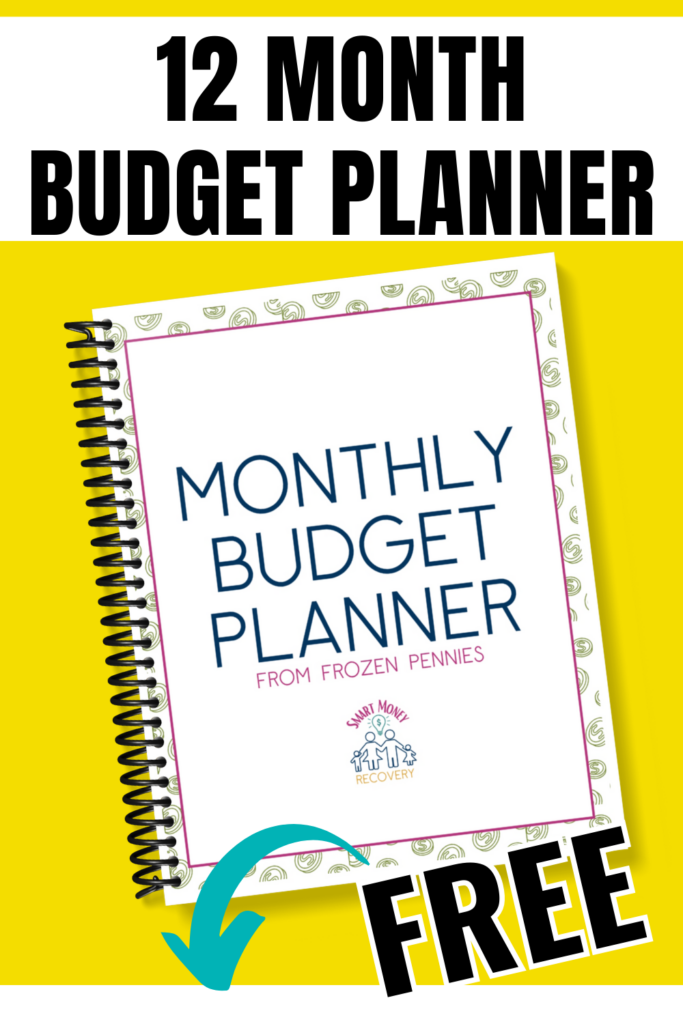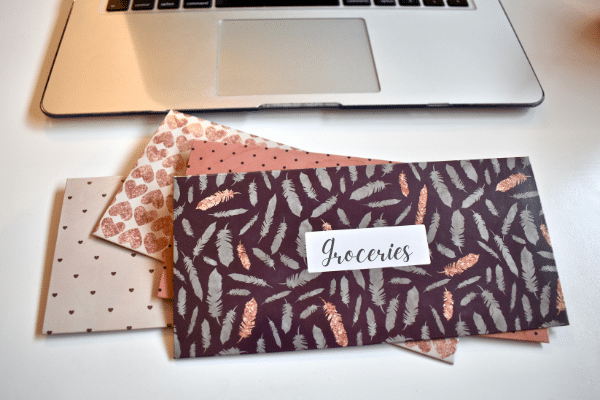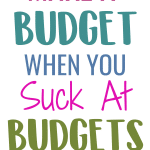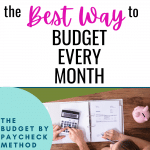We’ve all heard of living paycheck to paycheck…but what about budgeting from paycheck to paycheck? Budget by Paycheck may not be talked about as often as some of the more popular budgeting plans, but it might be the perfect method for you.
Today, we will talk about the Budget by Paycheck method…the basics, pros and cons, and how to set one up. Keep reading to learn all about this budgeting system to see if it is the right fit for your situation.

Do I need a budget?
No matter your income, a budget is essential to reduce stress in your day-to-day living, understand how much money you have at the end of the month, and help you reach financial goals.
When money is tight, budgeting is a way to keep your spending under control and eliminate debt by living within your means.
Budgets are even necessary when you have more money coming in than you need.
By establishing a budget, you will eliminate unnecessary spending and be able to work towards financial goals like becoming debt free, saving for college or retirement, or even fun goals like purchasing a vacation house.
What is the Budget by Paycheck Method?
The Budget by Paycheck method is a budget that is created based on your take-home amount each paycheck.
Unlike a typical monthly budget, where you plan for all your expenses and income for the entire month when you Budget by Paycheck, you focus on your incoming and outgoing money for that pay period.
If you are paid every other week, then you will budget for two weeks at a time. This may include scheduling recurring bills to spread out more equally between your pay periods.
The Budget by Paycheck method is a type of zero-based budget. This type of budget assigns a job for every penny you bring home.
You start with your take-home pay and then subtract every expense (including savings and investments) until you have zero dollars left.
You must get very specific with how your money will be spent each month and include line items like “gifts” and “entertainment.”
One significant benefit of a zero-based budget is knowing that every penny you bring will be used according to your plan.
The Budget by Paycheck method is a zero-based budget that divides your income and expenses according to your paychecks.
Budgeting by Paycheck is helpful for several reasons:
- It allows for closer monitoring: A monthly or yearly budget can be more difficult to track. A paycheck budget has you regularly checking in on your income and outgoing expenses.
- It is flexible: This type of budget is helpful when you have unexpected expenses or extra income. Since you are working with a shorter timeline for your budget, you can pivot more quickly to recover or reassess.
- It doesn’t allow you to go off track as easily: After you’ve established your Budget by Paycheck, you should be doing at least a quick review each time you are paid. This close monitoring means that you have less time to stray too far from your budgeted amounts or financial goals.

The budget by paycheck system also has some challenging aspects including:
- Upfront Work: The budget-by-paycheck system will require a fair amount of work to set up. Besides the usual budgeting tasks of writing down bills and expenses, you also have to decide how to distribute them between your two (or more) paycheck amounts. This could require changing billing dates with companies.
- Frequent monitoring: A healthy budget is reviewed regularly. With a Budget by Paycheck, you should be reviewing how you did and planning for the next budget period each time you are paid. This could be as often as weekly.

Who should use Budget by Paycheck?
Each type of budgeting has its benefits and drawbacks, so it is essential to consider the system that will work best for you!
Budget by Paycheck is a wonderful choice for:
- Beginning budgeters– Even though it requires more upfront work, a Budget by Paycheck will help a budgeting newbie monitor spending in manageable bite-sized pieces. You only need to budget until your next paycheck, so the system is a significant first step to budgeting.
- People who want to keep tight reins on their spending– If you’ve had difficulty staying on track with a longer-term monthly budget, a Budget by Paycheck will eliminate many of your issues. Since you will be checking in on your budget more often, you will have the ability to see when you are heading in the wrong direction right away and pivot to correct the problem.
- Type A Personalities– A budget by paycheck is a great fit for very organized and analytical personalities who want more control of their finances and monthly expenses.
What other budgeting systems are available?
Besides Budget by Paycheck, there are other budgeting systems to consider including:
50/30/20 Budget
Using the 50/30/20 budget, you will designate 50% of your take-home pay for necessities like house payments, groceries, and utilities, 30% for wants, and 20% for savings and/or debt repayment.
This budget is less restrictive since you keep spending within your pre-established percentage and don’t have to plan out every expense.
Envelope System
In the envelope budgeting system, your take-home pay is cashed out and placed into different envelopes, each assigned to a different budget category.
You can only spend the money in each envelope during your time period, so once the money is out for a particular category, spending is done!
This budget system is very tactile and easy to follow. It can also be used in combination with other budgeting systems.
In our house, we use a zero-balance budget combined with a modified version of the envelope system called the cash wallet system.
The envelope budgeting system can be done digitally (using savings accounts and debit cards). However, there is something to be said about using actual cash and envelopes.
This helps you visualize your spending, which can be especially helpful if you are new to budgeting.
Pay Yourself First (80/20 Budget)
This budgeting method works in the reverse of most other systems. With Pay Yourself First budgeting, 20 percent of your take-home pay FIRST goes towards your savings.
The remaining 80 percent of your pay goes towards your wants and needs.
This is a very loose (and simple) budget to follow because there isn’t much to track…however, by not assigning your money to a specific purpose, it can be easy to overspend and have “holes” in your budget.
You’ve considered all the budgeting systems and decided a Budget by Paycheck is the right fit for you. Now what?

Nine Steps to create your new paycheck budget.
Choose the right tools for monitoring your budget
First, consider the best way to organize and monitor your budget. Choose a medium that you like. Some options include paper, a digital spreadsheet, a budget planner, an app, or software.
Be sure to choose an option that you will actually use! If you love a more physical and visual budgeting tool, a classic notebook and pencil or a printable budget planner might be the best option.
If you are more tech-inclined, apps and software are available that can sync with your accounts, allowing you to know exactly where you are with your budget with a swipe of your finger.
Pull out all bank statements, receipts, etc
The next step in setting up your paycheck budget is determining precisely what you spend each paycheck.
I recommend pulling out all your bank account or checking account and credit card statements. Also, get receipts and bills to set your budget amounts realistically.
It is essential to have this information to find holes in your spending (unnecessary or extravagant expenses) and set better budget amounts for each spending category.
Create categories for your spending, and then look through your expenses and write down exactly how much you spent for each category over the past two pay periods.
Not how much you WANT to spend, but how much you ACTUALLY spent.
Some possible categories to consider using are House Payment (mortgage, rent, etc), Utilities, Groceries, Eating Out, Insurance, Student Loans, Internet, Phone, Car Payment, Gasoline, Clothing, Entertainment, Gifts, Retirement (401k), Kids’ Sports.
You can also check out this post I wrote with even MORE budget categories to consider. The more specific your line item, the more closely you can monitor your spending.
Create a budget for your pay period
A Budget by Paycheck means you will create a separate budget each time you get paid. For example, if you are paid bi-weekly and take-home pay is $3500, you will have TWO budgets each month with a starting amount of $3500.
To create this budget, you must first confirm your incoming financials. Add up all of the income from your job(s), government benefits, and child support. Don’t forget to include any regular bonuses or money you earn from side hustles.
PRO-TIP: If your incoming financials vary from paycheck to paycheck, create a budget based on the LESSER amount of money you could earn.
For example, if I have a side hustle that earns me between $50-100 each pay period, I will create my budget based on $50…then if I happen to get the higher amount, I can apply the “extra” towards paying down debt or my other financial goals.
Write down outgoing expenses
The next part of creating your Budget by Paycheck is to write down your outgoing financials for this pay period. With this type of budget, writing these down according to due dates is essential.
You may need to try and shift some of your bill due dates to spread out your recurring bills more equally between your two paycheck dates.
If your mortgage payment falls during your first paycheck period, you could try to shift your due dates for other big categories to fit your second paycheck budget.
Most companies will allow you to move your due dates within 15 days of the original due date without charging a fee. Call the companies to find out their policy. This is also a great time to see any possible savings options for cable or car insurance services.

Give every penny a job
Since a Budget by Paycheck is a zero-based budget, you want to give every penny a job. If there is extra money after subtracting your outgoing financials, you must assign them a category that makes sense.
This could mean adding more money towards your debt than usually budgeted, increasing savings, or even padding your gifts category for Christmas spending.
Creating a small buffer for unexpected expenses is also a great idea. You can do this by creating a line item in your budget for emergencies or padding categories that typically have unexpected expenses (automobile repairs, clothing, groceries, etc).

Consider using cash envelopes and establishing sinking funds
Using cash envelopes with a Budget by Paycheck is a smart way to stay within your budget. You can use cash envelopes with all your budgeted items OR only for variable expenses or line items where you tend to overspend.
After you have created your Budget by Paycheck, decide on cash envelope amounts.
Sinking funds are another fantastic option for your Budget by Paycheck. A sinking fund is putting money aside for an expense you know is coming.
Sometimes, we will know the amount we need to save, as is the case for a child’s school tuition or a house insurance payment. Other times, we need to anticipate the approximate amount of a cost, like Christmas gifts or a vacation.
As you craft your Budget by Paycheck, consider possible future expenses. Divide the total expense (or an estimate) by the number of months until it is due. Use this amount as a line item within your budget.
Check out this post for more sinking fund ideas to consider.
Decide where to cut back or how to make more money to reach your financial goals
As you are creating your Budget by Paycheck, it is time to reflect on how you can reduce expenses and/or if you need to earn more money to reach your financial goals.
Consider making your non-essential expenses more bare bones. Or try looking for a side hustle that could give you more wiggle room in your budget.
Establish your bill payment schedule on a calendar
In Step 3 of creating your Budget by Paycheck, you looked at due dates and tried to spread out your bills so that the expenses were more equal between your two paycheck periods.
It is time to create a bill payment schedule using a calendar.
I love to do this using a large wall calendar and different colored pens according to which paycheck the money comes from. You can also create a bill pay schedule using a spreadsheet, a budgeting app, or even schedule alarms on your smartphone.
If you decide to set up automatic payments from your bank to pay bills, I recommend recording those dates and amounts due in a budget planner or spreadsheet.
The important thing is that you are establishing a consistent bill pay schedule and have reminders of when you need to pay your bills.
Use any extra for debt repayment, retirement, or current financial goals
You’ve decided on a budget system, gathered your tools, tracked your outgoing expenses, created a budget according to each paycheck, given every penny in your budget a job, and, amazingly, found a little bit of extra cash at the end of a pay period.
What do you do? I encourage you to give that extra money more power by putting it towards debt repayment, retirement, or any other current financial goal!
Watching your money work FOR you is so exciting instead of being a stressor. You will feel powerful knowing that you made and executed a plan so well that you have extra money.
Keep that momentum going by applying this money towards your financial goals.
Other Tips to Consider for Paycheck Management:
Emergency Funds
Another consideration when creating your Paycheck by Budget is an Emergency Fund. Emergency funds are essential because they take the panic out of unexpected expenses. An unplanned expense can be devastating.
Adding an emergency fund line item to your budget will give you peace of mind now AND in the future. Although the expense might make your paycheck budget a little tighter, knowing that you have funds available in case of an emergency is worth it.
If you are working on getting out of debt, you should begin by trying to save $1,000 in your emergency fund. As your budget frees up, most experts advise an emergency fund of 3-6 months of living expenses.
You can read more about how to build up an emergency fund here.
Understand WHY you need to get financially organized
If you are trying to create a budget without understanding why you need to get financially organized, it will be much harder to stick with it.
The truth is budgeting is often a very painful and vulnerable process. Facing debt, analyzing your spending habits, and limiting your lifestyle can be difficult.
The WHY behind the financial organization is that it brings you a much longer-lasting peace and joy than living beyond your means.
Organizing your finances, although painful in the beginning, gives you authority over your money and the self-confidence that comes from living responsibly and meeting your goals.
Creating a budget and becoming financially organized is a practice in self-discipline that will ALWAYS be worth the effort you put into it.

Keep practicing and playing with your budget
One of the best things you can do for yourself as you establish your budget is to recognize that it can and should be a learning experience. Someone can rarely go from no budget to a perfect budget without any hiccups.
Keep working on your budget and change things that need changing. Keep learning about finances and try strategies that seem appealing and helpful for your situation.
And don’t be afraid to ask for help! As a financial coach, I would love to chat about your situation and advise you on budget tweaks or strategies.
Final thoughts on the budget by paycheck method:
The more you are on top of your budget, the better your odds with success can be. Creating a Budget by Paycheck can be very rewarding. You can reach your financial goals as you closely monitor your income and expenses and adapt your budget to fit your paycheck amounts. This system of zero-based budgeting is ideal if you have never budgeted before. It is a great way to get control of your money if you have an irregular income or variable paycheck dates.




 50/30/20 Budget: Could This Be Your Budgeting Method?
50/30/20 Budget: Could This Be Your Budgeting Method?